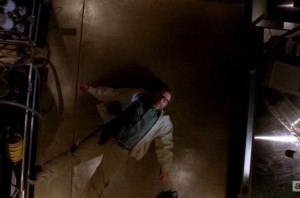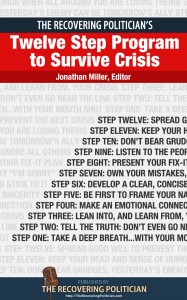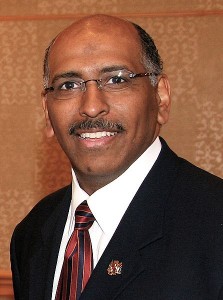By Lauren Mayer, on Wed Nov 27, 2013 at 8:30 AM ET Politics and show business make interesting but strange bedfellows – and one could say that’s both a metaphor and a literal statement (Jerry Brown & Linda Ronstadt, anyone?) For starters, there is substantial cross-over betwee the two fields – elections often seem more about show-biz glitz than issues, while actors complain about the ‘politics’ of casting. Plus celebrities frequently endorse candidates, who in turn may solicit those endorsements, or quote from plays and songs (or in the case of Herman Cain, lyrics from a Pokemon movie).
My career has been a hybrid of both, starting when I was a child trying to decide if my goal was to be a concert classical pianist or the first female president. (Yeah, I was an unambitious kid.) I wavered between going to law school or becoming a starving artist, and while I settled on the latter, I never lost my interest in politics. So it’s been great fun to combine both issues in these weekly videos, which has let me weigh in on current issues without having to mount a campaign. (I opted out of politics because of my thin skin and propensity to burst into tears at everything from Kodak commercials to being put on hold, not because of any skeletons in my closet – I have an embarrassingly unembarrasing past!)
But every now and then, a politician comes along whose entire career seems too theatrical to take seriously – sort of like the presidential campaigns of either Pat Paulsen (if you’re old enough to remember him) or Stephen Colbert (for everyone else). And we’ve had some doozies in this country – I’ve particularly enjoyed the hypocrites like Larry Craig, with his ‘I wasn’t playing footsie in an airport bathroom, I just have a really wide stance,’ or anti-gay activist George Rekers with his ‘rent-a-boy’ travel companion. However, nothing compares to Toronto’s Rob Ford – from denying he smoked crack to claiming he didn’t lie because reporters didn’t ask the right questions, to insisting that if bike riders get killed by cars, it’s their fault. In fact, more than a few people have wondered if his antics are just a giant performance art piece. – and I’m sure Anthony Weiner is wishing he’d run for mayor in Toronto, where his measly texted crotch shots would be child’s play. Meanwhile, Ford is defiantly staying in the public eye, despite being stripped of most of his authority and despite the additional allegations that come forward daily (from arrests for domestic violence to the checkered records of his driver and gym trainer). (And yes, “Rob Ford’s Gym Trainer” does seem like an incredible oxymoron.)
Rob Ford is larger than life, both literally and figuratively, and someone really should write a song about him. So I did.
By John Y. Brown III, on Wed Oct 9, 2013 at 12:00 PM ET It has been over a week since I first learned (as part of several other “spoiler alerts”) that Walter White of the TV series Breaking Bad dies in the series finale.
Even though he was only a fictional character in a fictional TV series, I got attached to Walter (or Walt, as I –and those who knew him well–preferred to call him). And even with nearly 10 real days having passed to grieve the death of a made-up person, I am not progressing well and unable to fully come to grips with his demise (as well as the show’s demise).
It’s not that I support glamorizing meth dealers in any way. Nothing could be further from the truth. But there’s something about Walt that I related to and made me cheer for him, despite his morally ambivalent situation that turned into morally atrocious nightmare but still somehow was understandable at some level.
I had a soft spot for Walt from the start because in my college intro to philosophy course we were given a hypothetical question about a husband and wife where the wife was dying of a terminal disease and the husband had to break the law to obtain the life saving drug he couldn’t afford. I was the only one in the class who vocally supported the husband stealing the life saving drug as morally justifiable under the circumstances. And I still do. And would like to hear my former classmates explain to their spouses tonight–for old time’s sake–why they wouldn’t be able to justify stealing the miracle drug to save their life.
That hypothetical was, more or less, the basic plot for the series Breaking Bad. With a few new variables….and unintended consequences.
I am not saying that Walt represented getting in touch with the inner meth kingpin that lives deep down in every middle-aged man. Not at all. But he did represent the getting in touch with the inner king, of sorts, that lives deep down in every man and wants to find a voice before he dies. Walt did realize that part of himself before it took over and became an ugly and dangerous tyrant that ultimately destroyed him. But he made the journey. And it was an rewarding TV journey to follow. From milquetoast repressed cowardly “soft man” to living out every instinct he had repressed for so long….and taking it to it’s logical extreme.
 “Every virtue, taken to an extreme, becomes a vice” taught the ancient Greeks. I learned that, too, in my intro to philosophy course. “Every virtue, taken to an extreme, becomes a vice” taught the ancient Greeks. I learned that, too, in my intro to philosophy course.
As Walt explains to his long suffering wife in one of the final scenes. “I did it because it made me feel alive.” Isn’t that what each of us is after in our own less destructive and more conventional way?
As fictional characters go, we lost a good one last week.
RIP Walter (Walt) White.
By Jonathan Miller, on Mon Sep 30, 2013 at 10:00 AM ET WARNING: PLENTY OF SPOILERS AHEAD
Wow. The greatest television show in the history of the program is over. And it was a brilliant sendoff.
(I have only one qualm: Why did Walt tell Lydia that her flu-like symptoms were the result of ricin poisoning? Doesn’t that give her the opportunity to get medical help? I only see two explanations — it is too late for Lydia’s salvation, or this yet another example of Walt’s hubris/sloppiness thwarting his intentions.)
Nearly two dozen members of the RP Nation submitted entries in our first/last annual “Breaking Bad” series finale (“Felina”) prediction contest. Most of our entries were quite creative, but WAY WAY off. So many of you had Skyler, and even poor Holly, dying; others were convinced Walt would off his former Gray Matter partners. And no one forecast the cameo return of the most hilarious comedy pair since Lucy and Desi — Badger and Skinny Pete.
Check out all of the entries here.
BUT we did find a winner — and it turns out he is a future recovering politician — Madison County (KY) Attorney Marc Robbins. Here’s Marc’s entry:
Walt rescues Jessie (bitch), blows away Todd and crew, and takes the ricin.
 Much to Marc’s discredit, his summary was quite brief; we all knew from the flash forward several weeks that Walt took the ricin from his old home; and Walt doesn’t “blow away” Todd — Jesse strangles him (kudos to Stuart Cobb for guessing that detail!) And what’s with that Facebook profile pic, Marc?!!!?!? Much to Marc’s discredit, his summary was quite brief; we all knew from the flash forward several weeks that Walt took the ricin from his old home; and Walt doesn’t “blow away” Todd — Jesse strangles him (kudos to Stuart Cobb for guessing that detail!) And what’s with that Facebook profile pic, Marc?!!!?!?
But one of the central unanswered questions was how Walt would treat Jesse should they meet again — and with Walt returning to his somewhat sympathetic roots, Marc was on the money. So he wins my two lower Rupp Arena tickets for the UNC Asheville game in November. Mazel Tov, Marc Robbins!
The prize for the most humorous entry goes to recovering blogger, Bob Layton. Here was his entry:

Bob Layton · Top Commenter · University of Kentucky Alternatively, Walter goes straight to the compound, is in the process of busting Jesse out when the neo-Nazis arrive. During the ensuing brawl, Walter, Jesse, and the neo-Nazis all spill through the fourth wall, onto an adjoining soundset where Buddy Bizarre is rehearsing a glitzy musical number called the French Mistake. Walter and Jesse then find their R.V., and hand in hand, ride off into the sunset.
While the competition was far tougher in this category (honorable mention to Adam Gibson, Sandy Levy, and Mike Mabry), Bob gets kudos for his evocation of two of my favorite things: marriage equality and Jewish humor (Buddy Bizarre and the French Mistake are references from Mel Brooks’ extraordinary film, Blazing Saddles).
So for kissing the tuchus of the judging panel, Bob wins autographed copies of both The Recovering Politician’s Twelve Step Program to Survive Crisis and John Y’s Musings from the Middle.
Guess I got what I deserved
Kept you waiting there too long my love.
All that time without a word
Didn’t know you’d think that I’d forget
Or I’d regret the special love I have for you –
My Baby Blue.
By John Y. Brown III, on Wed Sep 25, 2013 at 12:00 PM ET  My inner gansta raises its ugly head. My inner gansta raises its ugly head.
Because it can.
And to remind me I am a dangeorous man.
Last week I took four free mints instead of one when leaving a restaurant.
The week before I went through the Express Lane with 11 items.
 Next week? Next week?
Who’s to say?
I don’t even want to think about it.
(Note: after snapping this pic I got nervous and immediately re-parked. But strutted to the Thorton’s entrance. Because I could. And to remind myself that I am a dangerous man.)
===
For some people….and I suspect I am one of them.
If you really don’t watch us to touch something because of wet paint I recommend changing the sign from:
“DO NOT TOUCH -WET PAINT”
To
“Go ahead. Touch it. I dare you.”
By Krystal Ball, on Wed Sep 18, 2013 at 10:00 AM ET
By Jeff Smith, on Sun Sep 15, 2013 at 9:28 AM ET Contributing recovering politician Jeff Smith, who spent a year in federal prison for lying to federal authorities about a minor campaign finance violation, offers advice to his fellow pol/prisoner/hoopster Richie Farmer, set to spend some time in the can for public corruption charges. Here are excerpts from Smith’s piece in the (Louisville) Courier Journal:
Use your basketball skills to help others. Running the point and making your teammates better may be an effective way to build alliances.
• Be careful on the court. Some people who have it out for you may exploit the opportunity to try to hurt you on the athletic field and not get in trouble for it….
Don’t break prison rules.
• This may seem contradictory. The last rule suggested that you should tolerate prison rule-breaking — and you should. But try not to violate rules yourself.
• Don’t gamble. If you lose, you’ll be in debt and you do not want to be compromised like that. If you win, someone will be angry and may figure out a way to get his money back — a way that might leave you unrecognizable.
• Don’t “hold” anything someone asks you to hold. Even if it looks innocuous, it’s probably got contraband inside of it…
Don’t look for trouble.
• Don’t change the TV channel. There is a stringent seniority-based regime when it comes to TV watching, and your celebrity does not entitle you to alter it in any way.
• Don’t stare. There is generally no reason to make eye contact unless someone says your name.
• Don’t eat the Snickers. During orientation, you’ll watch a mandatory sexual assault prevention video featuring a guy warning you not to eat the Snickers bar that may be waiting for you on your bed in your cell. (The actor ate the one left under his pillow, unwittingly signaling the predator who left it for him that he was ready and willing.) All the guys watching the video will laugh. But take the video’s message to heart: Don’t accept sweets from anyone.
Click here for Smith’s full column in the Courier-Journal.
By Jonathan Miller, on Fri Sep 13, 2013 at 5:00 PM ET When we last left episode 5.13, “To’hajilee” of “Breaking Bad,” we were left with a tense cliffhanger — who would survive the standoff between the Neo-Nazi allies of Walter White and DEA law enforcement — with Walter and his former partner, now-bitter enemy, Jessee PInkman, in the crossfire?
We know from the flash-forwards at the beginning of the season that Walter survives. But what about Jesse? Walter’s DEA brother-in-law, Hank? Hank’s loyal partner Gomez?
My initial thought was that only Gomez would die — it is too early and too banal for Jesse and Hank, now the series’ moral centers, to perish.
But how would it be possible, given the Neo-Nazi’s massive weaponry, for only Gomez to survive?
So my bet is on a truce being reached, with no deaths. What say you?
Comment below:
By Jeff Smith, on Thu Sep 5, 2013 at 10:00 AM ET From WKUR- Public radio, Kansas City:
 Click here to order We’ve all seen it, a politician’s life derailed by scandal or personal crisis. While in years past that meant retirement from public life, nowadays we’re just as likely to see these individuals re-emerge to campaign another day.
On Wednesday’s Up to Date, we look at crisis management with Jeff Smith, one of the contributors to The Recovering Politician’s Twelve-Step Guide to Surviving Crisis. A recovering legislator himself, Smith relates his path from the Missouri statehouse to prison. He reveals how the lessons he and others have learned in handling their crises can be beneficial even to those of us who live much more private lives.
Click here for the interview.
By Michael Steele, on Thu Aug 29, 2013 at 1:30 PM ET From 92Y at the Jefferson:
 Former Chairman of the Republican National Committee Michael Steele recently sat down with 92Y Producer Jordan Chariton at The Jefferson Hotel in Washington, D.C. to discuss how to revive the Republican Party. Former Chairman of the Republican National Committee Michael Steele recently sat down with 92Y Producer Jordan Chariton at The Jefferson Hotel in Washington, D.C. to discuss how to revive the Republican Party.
In part two of our extended interview, Steele touched on everything from the Tea Party movement to the Trayvon Martin case.
Steele doesn’t see Tea Party lawmakers as obstructionists:
“They had a charge from the people who elected them…you go to Washington and you draw a line in the sand, you put a hold on the amount of spending, and you say no to more spending without some level of contraction.”
Where Steele does acknowledges issues Republicans are having is with communication, specifically with minority groups, joking:
“I think there’s a huge gap between our brain and our mouth,” Steele said, adding, “You don’t always express what you’re thinking without thinking it through.”
Steele also shared his views on the murder of Trayvon Martin.
“A 17-year-old African American with a bottle of tea and a bag of Skittles was killed for no reason other than being black, young, wearing a hoodie.”
He also spoke about President Obama’s election, pointing out that it has not ended racism in America.
“Obama’s election was not a panacea for race relations. All these folks running around talking about, ‘Oh, we’re in a postracial America’ … BS, as the Trayvon Martin case readily proves.”
Do you agree with Steele’s take on the Trayvon Martin murder? Comment below.
By Jeff Smith, on Thu Aug 22, 2013 at 1:00 PM ET From Buzzfeed:

Jenji Kohan, the creator of Netflix’s new hit series Orange Is The New Black, had to grapple with a pretty serious conundrum: How do you make a compulsively watchable series about a milieu whose defining characteristic is boredom? And yet, the show’s writers have pulled it off.
Of course, they have had to take some liberties; the series is based on Piper Kerman’s memoir but is highly fictionalized. So what did they get right about prison life, and what did they miss?
Though my year in federal prison was quite unlike Piper Kerman’s — largely on account of the differences between men’s and women’s prisons — here’s my assessment of where Orange nailed it and where it missed the mark.
Here’s what they get right:
Small things can have outsize consequences — in positive and negative ways.
|
The Recovering Politician Bookstore
|















